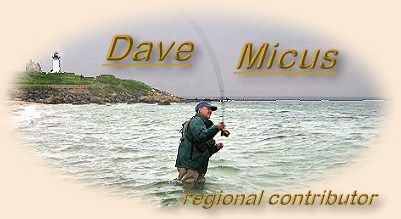|
Off-season is a trying time for your average Nor'eastern
striped bass bum. With no fish to catch and too much
time on our hands, we find ourselves doing things to
fill the void that we would never consider doing during
fishing season. Tying flies and tinkering with tackle
gets us through November, but then we hit the wall. The
more fortunate of us hunt, which can consume a good part
of the long winter until the first bass shows up on the
shores of Cape Ann in mid-May. The rest of us are idle,
and an idle sportsman is a dangerous thing.
Finding myself in the midst of one of the coldest winters
on record in Massachusetts (it was -45 with the wind chill
last recently), and with my fly tying table banished to
the unheated basement because of the mess I make, I
decided to resume my hobby of collecting antique fly
tackle. Resume is the wrong word, maybe resuscitate
says it better. I had always intended to decorate my
walls with old bamboo rods and line my shelves with
antique reels, but in (not very diligently) searching
antique stores for the past seven years, I managed to
find only one Meisselback Featherweight reel and an
old twelve-foot-solid-wood rod with a rattan handle,
collapsible guides and a nickel-silver reel seat,
manufacturer unknown-a nice piece but from what I
read not really worth anything.
Collecting antique tackle is the 5th level toward
fly-fishing Enlightenment. The first level is
purchasing the equipment you'll use; second is fly
tying; third is limiting yourself to reading only
fly-fishing books; fourth is only buying clothing
garnished with fish or flies. There are higher levels,
but they are not revealed until you master the level
you're on (but I'm sure rod building is in there
somewhere). I've been stuck on level five, but then
I discovered eBay.
eBay is a fairly recent phenomenon, and has a virtual
monopoly on the on-line bidding market. It's not that
the idea is proprietary, or the execution too complex
for others to copy; no other entrepreneurs jumped on
board because the whole concept of eBay relies on a
trustworthy seller and a trustworthy buyer, something
anathema to American enterprise. By the time it was
proven that you could have a deal with two honorable
parties, it was too late-eBay had already captured
the market.
I searched "antique fly fishing" on the site, and lo,
three full pages of old fishing gear appeared. I
could virtually, pardon the pun, complete my collection
in one visa-card-maximum-limit-busting bidding orgy.
It was too easy. From sources deep within, I summoned
the strength not to mortgage my house, but, like drinking,
or drugs, or fishing, for that matter, bidding on eBay
is strangely addictive.
It was apparent I had to limit my interests, and I
decided to focus on old fly reels, but even then I
would have to be more specific. Old wooden fly
reels seemed a logical choice; they're rare, but
still not very expensive, and would make a unique
collectible. I still had ten plus to choose from.
As an eBaby novice I had a lot to learn about the
intricacies of bidding. Some were transparent, such
as don't start raising the bid on an item that still
has a long time on the auction block. Others were
not so clear. For instance, it's wise to make an
educated guess as to the future availability of an
item. Often an item will appear for the first time,
bring in an excellent price, and spark others who
recall "hey, I have one of those in my attic" to
dig it out and put it up for bid, flooding the market
and lowering the value. I was involved in bidding
on a piece of antique flying tying equipment but
quit when the bid got over $80, which was just a
little too rich for me. Within a week the exact
same item appeared and I got it for under $10.
Conversely, I recently bought an old wooden reel
for about $90, and shortly thereafter a lot of 8
wooden reels sold for $78. Though they weren't in
the same condition as the reel I purchased, it was
still a much better deal. Later I bought a wooden
reel for $18. Immediate gratification costs extra
on eBay.
Bidding wars pose a bit of a psychological problem.
It's similar to buying a house; once you get to a
certain price, 5, 10, or even 20% more doesn't seem
like much, and you get caught up in the spirit of
competition. When the bidding is done you look at
the total and think, 'there must be some mistake!'
I've heard it said that hunters feel a strange
mixture of elation and remorse over what they shoot;
winning a bidding war on eBay evokes the exact same
emotion.
But losing an item can be even worse. I was once
bidding on a nice reel, and decided to wait until
the last 15 seconds to assure I'd win. I posted
my bid with about three seconds left, was the high
bidder for a fraction of a second, but lost the
item. It just didn't seem possible. It was then
that I learned about snipers. A sniper is a computer
program that you can purchase to assist with bidding.
You enter the item number, the time the bidding ends,
and the maximum amount you're willing to pay. The
program monitors the bidding, and at the last second
will enter your bid if it is higher than the current
price. This happened to me twice, outwitted both
times by the same sniping buyer. On my third try
another sniper entered the fray, and my high bid of
$64 jumped to $117 in the last three seconds of bidding
because of the snipers competing. My nemesis won the
bid, but he must have expended his wooden fly reel
budget for the year because I haven't seen him on
eBay since.
As in any business deal, it pays to read the fine
print. I was high bidder on a nice wooden reel
from a seller in England (where most of the wooden
reels come from) before I realized he wanted his
payment in English pounds and he would not ship
outside of the U.K. I could have reneged at that
point, but I wanted the reel. Through a series of
coincidences, I was able to get a check (cheque)
from a work acquaintance with an English bank account,
and then negotiated with an office mate to have the
reel shipped to his mother's house (flat) in London.
The whole thing was extremely time consuming, and no
illicit drug deal or money-laundering scheme could
have been more complex.
To date, I've purchased seven old wooden fly reels,
two of which have yet to arrive from England (I'm
counting on that 'honest seller' thing!). Regressing
to level three, I bought a book by Stephen Bodio for
a penny (I was embarrassed to pay a penny and offered
the seller $2.50, but he refused), and the hard cover
version of Peter Mathissen' s Men's Lives for $25. I
bought a wood and brass 'priest' (an impulse purchase
that flies in the face of my catch and release ethics),
and a batch of wooden bobbins for next to nothing. I'm
keeping track of some signed books by Tom McGuane and
Jim Harrison, a few more wooden reels, and a lobster
carved out of pre-ban elephant bone (which is straying
from the path toward Enlightenment but, still a neat
collectible).
And I'm considering collecting antique netsukes,
tiny, intricate ivory carvings that were used in
Japan as clasps on small bags. There are dozens
of them on eBay, and quite a few of them have fish
or fishermen themes, a combination of art, culture
and fishing that will add some sophistication to
my fly fishing compulsion and might just be level
6, though that's yet to be revealed.
I've also upped the limit on the visa card.
~ Dave
About Dave:
 Dave Micus lives in Ipswich, Massachusetts. He is an
avid striped bass fly fisherman, writer and instructor.
He writes a fly fishing column for the Port City Planet
newspaper of Newburyport, MA (home of Plum Island and Joppa Flats)
and teaches a fly fishing course at Boston University.
Dave Micus lives in Ipswich, Massachusetts. He is an
avid striped bass fly fisherman, writer and instructor.
He writes a fly fishing column for the Port City Planet
newspaper of Newburyport, MA (home of Plum Island and Joppa Flats)
and teaches a fly fishing course at Boston University.
|

 Dave Micus lives in Ipswich, Massachusetts. He is an
avid striped bass fly fisherman, writer and instructor.
He writes a fly fishing column for the Port City Planet
newspaper of Newburyport, MA (home of Plum Island and Joppa Flats)
and teaches a fly fishing course at Boston University.
Dave Micus lives in Ipswich, Massachusetts. He is an
avid striped bass fly fisherman, writer and instructor.
He writes a fly fishing column for the Port City Planet
newspaper of Newburyport, MA (home of Plum Island and Joppa Flats)
and teaches a fly fishing course at Boston University.